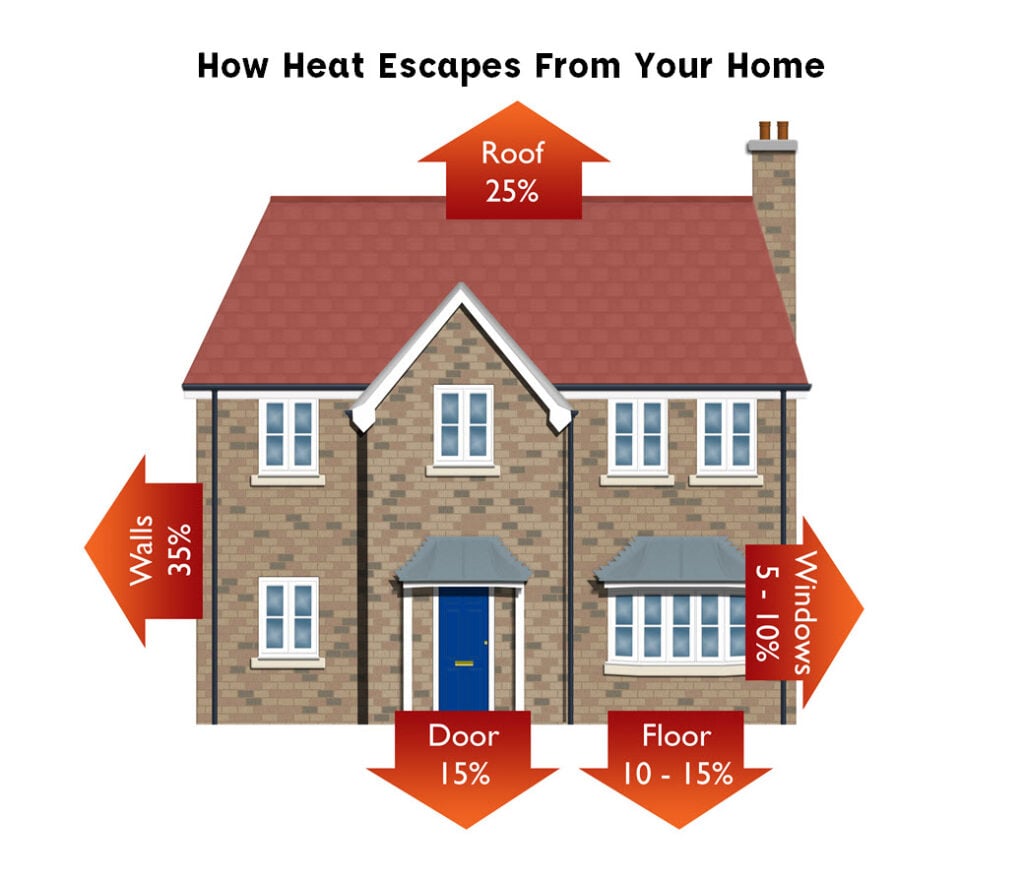What You Need To Know To Stop Heat Loss At Home
Whether you rent or own your home, learning how to stop heat loss from escaping and causing unnecessary expenses is essential. All homeowners share the same concerns about the warmth of their houses during winter.
Moreover, this is especially relevant with the new global energetic crisis and inflation. Therefore, saving money on bills while keeping your home at a comfortable temperature in winter is the main goal for everyone.

It’s Time To Think About Heat Loss And Do Something About It
With every cold winter, we often neglect how heat loss affects our homes and our heating bills. And with the current state of the economy, it’s time to think about fixing things. Every year, it’s essential to prep your home for winter and learn how to keep heat loss to a minimum.
But adding an excellent heating system to your home solves half the problem. Homeowners must devise solutions to keep the warm air in their homes from escaping. Furthermore, this is important for saving energy and money and keeping your heating unit working correctly without overusing it.
If you have trouble spots in your home where heat escapes, don’t you think it’s time to make the necessary changes and stop heat loss? Below, you’ll discover some ways you can.

Maintain Your Heating System Yearly
Ideally, every household has a heating system, but only some maintain it properly. Depending on the type of heating source in your home, you need to know how to maintain them to keep them working correctly to avoid heat loss. Also, please know how to clean them, when to do so, and whether or not the air filters require replacement.
Winters are harsh, especially in regions with a continental climate. That means people living there would need to spend more on keeping their houses warm during the winter. If you live in Ontario, Canada, look for the best heating contractor St Catharines has to offer. And to receive the best advice for your heating unit and how to maintain it properly.

Check The Placement Of Your Furniture
Above all, checking to see if any furniture obstructs your heating unit is a good idea furniture blocks your heating unit. For example, your sofa can make your home feel colder than it should. It’s a good idea to check to see if it’s covering your air vents. Obstructions of your heating system can easily cause the warm air not to come out.
Also, check to make sure all of the vents in your home are open properly and make sure they are clear of any debris. Now is a good time to rearrange your furniture for optimum heat circulation.

Repair Cracks Where Heat Loss Escapes From And Often
If you know your home has experienced issues with escaping water and wall fissures, you should probably check for wall cracks, mold, and dampness. Cracks can hide in places like ceilings and wall corners, so make sure to inspect your home well. And these openings can account for heat loss in your home.
If you discover any in your home, you should seal or fix them immediately. No household would want to have this issue as the winter months approach. If you leave cracks in your walls in the winter, losing the warm air in your house is not the only concern that should worry you. Water from the melting snow can easily find its way into your home. Please carefully look over your walls before the cold season.

Insulate Your Home Properly
You should also consider insulating your home because cool air can readily pass through walls and windows. Of course, this can make your house feel colder. By decreasing the heat escaping in the winter, additional insulation layers will serve as a barrier for warmth and rapidly heat your living spaces. Moreover, this will increase the comfort level in your house and may even eventually lower your long-term heating costs.
In addition, wall insulation will also benefit you in the summer since it can prevent warm air from entering your home, keeping it cooler. Sealing your windows is another great idea. No matter the window type, cool air can easily find its way into your home since no window is fully airtight. Using weatherstripping, you may seal your home’s windows at a reasonable price. For securing windows, compression weatherstripping is the best long-term option. Proper insulation prevents heat loss all year round.

Final Heat Loss Thoughts
Most home warmth loss happens in locations we don’t frequently look at or think to create issues for heat loss. For example, consider air leaks; even the smallest holes can allow heat to escape. So, heat can escape from your home, and cold, stale outside air can enter if it has inadequate insulation or any fracture or opening.
When that occurs, your heating system needs to work harder to keep your house warm, raising your heating bill and causing discomfort for you and your wallet. Air leaks usually occur in drafty locations like window frames, entrances, attics, basements, chimneys, and vents.

Moving is always stressful, especially when you think about the number of damaging items that result from moving. But, at first, it’s exciting to think of your new home, the potential the space offers, and even the thought of discovering a new neighborhood.






